formerly eScholarship Editions


|
|
|
|
Your search for
'Psychiatry' in subject
found 14 book(s). | Modify Search | Displaying 1 - 14 of 14 book(s) | |
| 1. | 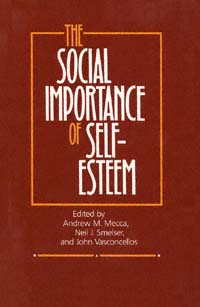 | Title: The Social importance of self-esteem Author: Mecca, Andrew Published: University of California Press, 1989 Subjects: Sociology | Psychiatry Publisher's Description: Is the well-being of a society dependent on the well-being of its citizenry? Does individual self-esteem play a causal role in chronic social problems such as child abuse, school drop-out rates, teenage pregnancy, alcohol and drug abuse, welfare dependency?In an attempt to answer these questions, the State of California established a task force on self-esteem and social responsibility in 1987. The aim of this body was to determine what connections might exist between these two factors and to suggest policy guidelines relating to the welfare of Californians and to the expenditure of public resources. The ten essays in this volume, prepared by faculty members of the University of California, draw on research in the social and behavioral sciences to explore these issues. They assess the substantive assertions and research findings in the field and make careful evaluations of their reliability and validity. In many cases strong connections between self-esteem and problematic behavior are established, in others the connections are weak, and in some the causal relationship is, as yet, imperfectly understood.One of the conclusions of the book is that research on these issues needs to be improved, particularly in the areas of comparative and longitudinal studies. Guidelines for future research are suggested, and some points of policy direction are elaborated. These essays may indeed promote additional research, for the premise that social stability and welfare are largely dependent on the psychological state of a people poses a challenging and provocative counter-emphasis to the assumption that social institutions are the primary determinants of individual welfare. [brief] Similar Items |
| 2. | 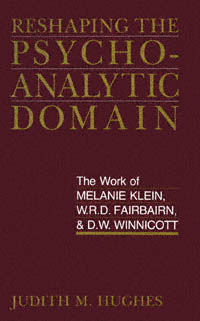 | Title: Reshaping the psychoanalytic domain: the work of Melanie Klein, W.R.D. Fairbairn, and D.W. Winnicott Author: Hughes, Judith M Published: University of California Press, 1989 Subjects: History | Intellectual History | Psychiatry Publisher's Description: Tracing the line of succession from Sigmund Freud, through Melanie Klein to Fairbairn and Winnicott, Judith Hughes demonstrates the internal development of the British school of psychoanalysis and the coherence of its legacy. Both lay reader and professional will find the book illuminating. Similar Items |
| 3. | 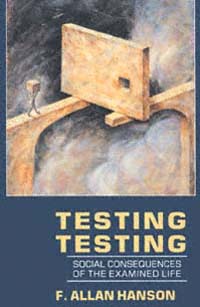 | Title: Testing testing: social consequences of the examined life Author: Hanson, F. Allan 1939- Published: University of California Press, 1992 Subjects: Anthropology | Sociology | Medical Anthropology | Psychiatry Similar Items |
| 4. |  | Title: Inheriting madness: professionalization and psychiatric knowledge in nineteenth-century France Author: Dowbiggin, Ian R Published: University of California Press, 1991 Subjects: History | European History | Sociology | Psychiatry Publisher's Description: Historically, one of the recurring arguments in psychiatry has been that heredity is the root cause of mental illness. In Inheriting Madness , Ian Dowbiggin traces the rise in popularity of hereditarianism in France during the second half of the nineteenth century to illuminate the nature and evolution of psychiatry during this period.In Dowbiggin's mind, this fondness for hereditarianism stemmed from the need to reconcile two counteracting factors. On the one hand, psychiatrists were attempting to expand their power and privileges by excluding other groups from the treatment of the mentally ill. On the other hand, medicine's failure to effectively diagnose, cure, and understand the causes of madness made it extremely difficult for psychiatrists to justify such an expansion. These two factors, Dowbiggin argues, shaped the way psychiatrists thought about insanity, encouraging them to adopt hereditarian ideas, such as the degeneracy theory, to explain why psychiatry had failed to meet expectations. Hereditarian theories, in turn, provided evidence of the need for psychiatrists to assume more authority, resources, and cultural influence. Inheriting Madness is a forceful reminder that psychiatric notions are deeply rooted in the social, political, and cultural history of the profession itself. At a time when genetic interpretations of mental disease are again in vogue, Dowbiggin demonstrates that these views are far from unprecedented, and that in fact they share remarkable similarities with earlier theories. A familiarity with the history of the psychiatric profession compels the author to ask whether or not public faith in it is warranted. [brief] Similar Items |
| 5. | 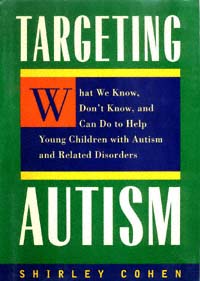 | Title: Targeting autism: what we know, don't know, and can do to help young children with autism and related disorders Author: Cohen, Shirley Published: University of California Press, 1998 Subjects: Sociology | Social Problems | Education | Psychology | Psychiatry | Medicine Similar Items |
| 6. |  | Title: Hysteria beyond Freud Author: Gilman, Sander L Published: University of California Press, 1993 Subjects: History | Literature | Women's Studies | Psychiatry | Medicine Publisher's Description: "She's hysterical." For centuries, the term "hysteria" has been used by physicians and laymen alike to diagnose and dismiss the extreme emotionality and mysterious physical disorders presumed to bedevil others - especially women. How has this medical concept assumed its power? What cultural purposes does it serve? Why do different centuries and different circumstances produce different kinds of hysteria?These are among the questions pursued in this absorbing, erudite reevaluation of the history of hysteria. The widely respected authors draw upon the insights of the new social and cultural history, rather than Freudian psychoanalysis, to examine the ways in which hysteria has been conceived by doctors and patients, writers and artists, in Europe and North America, from antiquity to the early years of the twentieth century. In so doing, they show that a history of hysteria is a history of how we understand the mind. [brief] Similar Items |
| 7. | 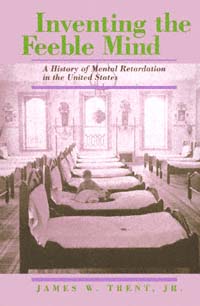 | Title: Inventing the feeble mind: a history of mental retardation in the United States Author: Trent, James W Published: University of California Press, 1994 Subjects: History | United States History | Sociology | American Studies | Psychiatry Publisher's Description: James W. Trent uses public documents, private letters, investigative reports, and rare photographs to explore our changing perceptions of mental retardation over the past 150 years. He contends that the economic vulnerability of mentally retarded people (and their families), more than the claims mad . . . [more] Similar Items |
| 8. | 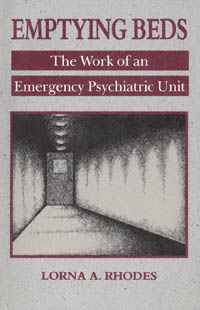 | Title: Emptying beds: the work of an emergency psychiatric unit Author: Rhodes, Lorna A. (Lorna Amarasingham) Published: University of California Press, 1991 Subjects: Anthropology | Medical Anthropology | Psychiatry | Social Problems | Medicine Publisher's Description: The work of inner-city emergency psychiatric units might best be described as "medicine under siege." Emptying Beds is the result of the author's two-year immersion in one such unit and its work. It is an account of the strategies developed by a staff of psychiatrists, social workers, nurses, and ot . . . [more] Similar Items |
| 9. | 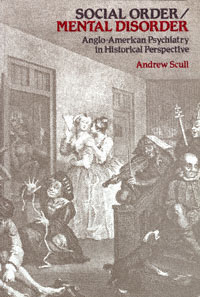 | Title: Social order/mental disorder: Anglo-American psychiatry in historical perspective Author: Scull, Andrew T Published: University of California Press, 1989 Subjects: Sociology | Psychiatry | United States History | European History | Psychology Similar Items |
| 10. | 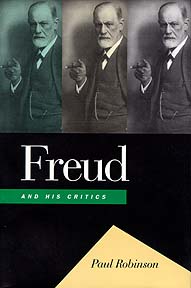 | Title: Freud and his critics Author: Robinson, Paul A 1940- Published: University of California Press, 1993 Subjects: History | Intellectual History | Autobiographies and Biographies | Psychology | Psychiatry Publisher's Description: Wars against Freud have been waged along virtually every front during the past decade. Now Paul Robinson takes on three of Freud's most formidable critics, mounting a thoughtful, witty, and ultimately devastating critique of the historian of science Frank Sulloway, the psychoanalyst Jeffrey Masson, and the philosopher Adolf Grünbaum.Frank Sulloway contends that Freud took most of his ideas from Darwin and other contemporary thinkers - that he was something of a closet biologist. Jeffrey Masson charges that Freud caved in to peer pressure when he abandoned his early seduction theory (which Masson believes was correct) in favor of the theory of infantile sexuality. Adolf Grünbaum impugns Freud's claim to have grounded his ideas - especially the idea of the unconscious - on solid empirical foundations.Under Robinson's rigorous cross-examination, the evidence of these three accusers proves ambiguous and their arguments biased by underlying assumptions and ideological commitments. Robinson concludes that the anti-Freudian writings of Sulloway, Masson, and Grünbaum reveal more about their authors' prejudices - and about the Zeitgeist of the past decade - than they do about Freud.Beautifully crafted and full of surprises, Robinson's work is a compelling defense of one of history's most original and powerful minds. Freud and His Critics will earn an enduring place in the raging Freudian debate. [brief] Similar Items |
| 11. | 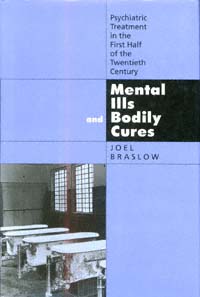 | Title: Mental ills and bodily cures: psychiatric treatment in the first half of the twentieth century Author: Braslow, Joel T 1959- Published: University of California Press, 1997 Subjects: Science | Psychiatry | Medicine | History and Philosophy of Science | Psychology Publisher's Description: Mental Ills and Bodily Cures depicts a time when psychiatric medicine went to lengths we now find extreme and perhaps even brutal ways to heal the mind by treating the body. From a treasure trove of California psychiatric hospital records, including many verbatim transcripts of patient interviews, Joel Braslow masterfully reconstructs the world of mental patients and their doctors in the first half of the twentieth century. Hydrotherapy, sterilization, electroshock, lobotomy, and clitoridectomy - these were among the drastic somatic treatments used in these hospitals.By allowing the would-be healers and those in psychological and physical distress to speak for themselves, Braslow captures the intense and emotional interplay surrounding these therapies. His investigation combines revealing clinical detail with the immediacy of "being there" in the institutional setting while decisions are made, procedures undertaken, and results observed by all those involved. We learn how well-intentioned physicians could rationalize and regard as therapeutic treatments that often had dreadful consequences, and how much the social and cultural world is inscribed within the practice of biological psychiatry. The book will interest historians of medicine, practicing psychiatrists, and everyone who knows or has seen what it's like to be in mental distress. [brief] Similar Items |
| 12. | 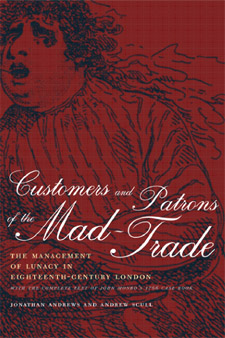 | Title: Customers and patrons of the mad-trade: the management of lunacy in eighteenth-century London: with the complete text of John Monro's 1766 case book Author: Andrews, Jonathan 1961- Published: University of California Press, 2003 Subjects: History | History of Science | Psychology | Social Problems | Psychiatry Publisher's Description: This book is a lively commentary on the eighteenth-century mad-business, its practitioners, its patients (or "customers"), and its patrons, viewed through the unique lens of the private case book kept by the most famous mad-doctor in Augustan England, Dr. John Monro (1715-1791). Monro's case book, comprising the doctor's jottings on patients he saw in the course of his private practice--patients drawn from a great variety of social strata--offers an extraordinary window into the subterranean world of the mad-trade in eighteenth-century London. The volume concludes with a complete edition of the case book itself, transcribed in full with editorial annotations by the authors. In the fragmented stories Monro's case book provides, Andrews and Scull find a poignant underworld of human psychological distress, some of it strange and some quite familiar. They place these "cases" in a real world where John Monro and othersuccessful doctors were practicing, not to say inventing, the diagnosis and treatment of madness. [brief] Similar Items |
| 13. | 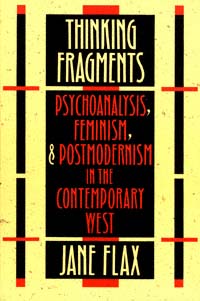 | Title: Thinking fragments: psychoanalysis, feminism, and postmodernism in the contemporary West Author: Flax, Jane Published: University of California Press, 1990 Subjects: Gender Studies | Psychiatry | Political Theory | Literary Theory and Criticism Publisher's Description: Thinking Fragments provides a brilliant critique of psychoanalytic, feminist, and postmodern theory. Examining the writings of Freud, Winnicott, Lacan, Chodorow, Irigaray, Derrida, Rorty, and Foucault, among others, Flax conducts a "conversation" among psychoanalysts, feminist thinkers, and postmodern theorists, evaluating the ways in which each group of thinkers succeeds in coming to terms with crises in contemporary Western culture. As she analyzes each theory in turn, the others are used to identify and interrogate its gaps and omissions. The result is a postmodern text of intertwined ideas, devoid of clear beginnings, endings, conclusions.Flax addresses the question, "how is it possible to theorize in the contemporary West?" With the demise of objective notions of truth, knowledge, self and power, intellectuals have devised these new modes of thinking which both reflect and contribute to the uncertainties of the contemporary West. Each also addresses at least one aspect of what has become most problematic to modern individuals: How to come to terms with self, gender, knowledge and power without resorting to concepts that stress objectivity, universal knowledge, and a unitary self.Flax finds that neither psychoanalysis, nor feminism, nor postmodernism is adequate to the task for which it was conceived. Each can illuminate certain aspects of problems of self, gender, knowledge, and power, but none is sufficient on its own. In fact, each incorporates characteristic blindnesses rooted in part in the very difficulties it addresses. Despite their failures, Flax concludes that these modes of theorizing are our best tools thus far, compelling us to use them even while we grapple with the problems they raise. Thinking Fragments is a wide-ranging study that will elicit much discussion and debate. It is an essential text for social scientists and humanists alike, as well as anyone else who thinks about how to "do" theory in the contemporary West. [brief] Similar Items |
| 14. | 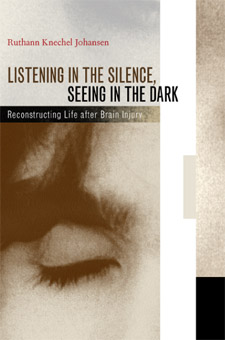 | Title: Listening in the silence, seeing in the dark: reconstructing life after brain injury Author: Johansen, Ruthann Knechel 1942- Published: University of California Press, 2002 Subjects: Medicine | Health Care | Autobiographies and Biographies | Medical Anthropology | Psychiatry Publisher's Description: Traumatic brain injury can interrupt without warning the life story that any one of us is in the midst of creating. When the author's fifteen-year-old son survives a terrible car crash in spite of massive trauma to his brain, she and her family know only that his story has not ended. Their efforts, Erik's own efforts, and those of everyone who helps bring him from deep coma to new life make up a moving and inspiring story for us all, one that invites us to reconsider the very nature of "self" and selfhood. Ruthann Knechel Johansen, who teaches literature and narrative theory, is a particularly eloquent witness to the silent space in which her son, confronted with life-shattering injury and surrounded by conflicting narratives about his viability, is somehow reborn. She describes the time of crisis and medical intervention as an hour-by-hour struggle to communicate with the medical world on the one hand and the everyday world of family and friends on the other. None of them knows how much, or even whether, they can communicate with the wounded child who is lost from himself and everything he knew. Through this experience of utter disintegration, Johansen comes to realize that self-identity is molded and sustained by stories. As Erik regains movement and consciousness, his parents, younger sister, doctors, therapists, educators, and friends all contribute to a web of language and narrative that gradually enables his body, mind, and feelings to make sense of their reacquired functions. Like those who know and love him, the young man feels intense grief and anger for the loss of the self he was before the accident, yet he is the first to see continuity where they see only change. The story is breathtaking, because we become involved in the pain and suspense and faith that accompany every birth. Medical and rehabilitation professionals, social workers, psychotherapists, students of narrative, and anyone who has faced life's trauma will find hope in this meditation on selfhood: out of the shambles of profound brain injury and coma can arise fruitful lives and deepened relationships. Keywords: narrative; selfhood; therapy; traumatic brain injury; healing; spirituality; family crisis; children [brief] Similar Items |